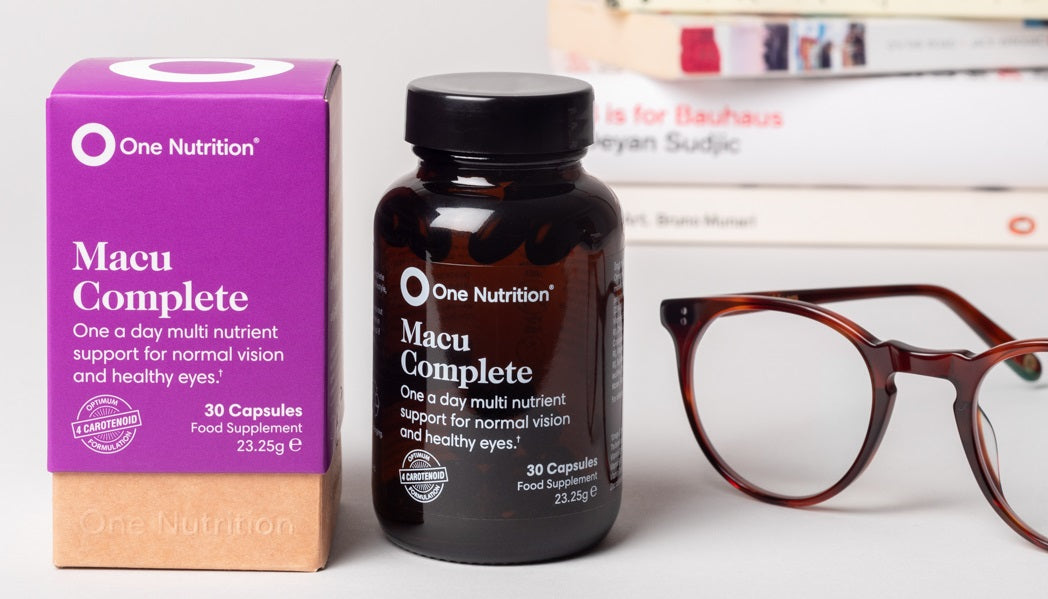
Macu Complete
Supplements for eye health are commonplace in health stores and regularly recommended by opticians. However, many people who might benefit from them are not aware of the options available that can help support a preventative approach to eye health or even slowed the progression of common eye problems.
One Nutrition’s Macu Complete is a multi-targeted approach to eye care, specifically developed based on the promising formulas used within the AREDS’ research – two major clinical trials sponsored by The National Eye Institute and published in 2001 and 2013.
Unlike many supplements on the market which simply copy the AREDS OR AREDS2 formulation, Macu Complete utilises a more extensive selection of ingredients than the AREDS2 formula. Macu Complete is a new formula, which combines insights gained about these researched nutrients with other compounds which can be beneficial to overall eye health.
WHAT ARE THE INGREDIENTS IN MACU COMPLETE?
Lutein and Zeaxanthin are carotenoids, a family of nutrients typically found in yellow, orange and red foods. Lutein and Zeaxanthin are found in high concentrations in the Macula, at the back of the eye, along with Meso-Zeaxanthin. While potentially lesser-utilised in eye supplements, Meso-Zeaxanthin is the primary carotenoid in the macula, and the three are collectively known as ‘Macular Pigment’ (MP). Because Macu Complete contains all three of these carotenoids, it stands out from other formulations.
A supplement of these compounds was discussed in Michael Mosley’s TV programme ‘Trust Me, I’m a Doctor’ , where, discussed with Professor Nolan, a researcher in eye health, he undertook a short term study looking at the effects of such supplements. After 12 weeks he said his eyesight had improved.
Macu Complete also contains a further carotenoid blend called Evtene, a unique carotenoid blend containing alpha carotene, beta carotene, and lypopene. Evtene contains alpha-carotene, whereas other formulas do not.
Not only this, but Macu Complete contains added nutrients such as Grape Seed Extract, for anti-oxidant properties, and Omega 3-containing Algal oil, for health benefits associated with Omega 3. Vitamin C, zinc, copper, and vitamin E, are also included in the formula, to align closely with the AREDS2 formula, although in slightly decreased values to allow for the above ingredients.
Macu Complete has been formulated to reflect the positive research and findings undertaken on nutrients specific to eye health. For those that are living with eye conditions, products such as Macu Complete could provide an option for those with conditions that have limited medical interventions
AGE-RELATED EYE DISEASE STUDY (ARED) SUMMARY
One of the most well known pieces of research on eye health was a major clinical trial sponsored by the National Eye Institute of America, called the Age-related Eye Disease (ARED) studies.
The first Age-Related Eye Disease Study was published in 2001, and indicated that ‘5 years of supplementation with high doses of antioxidant vitamins, copper, and zinc reduced the risk of developing advanced AMD (age-related Macular Degeneration) in 30% of individuals in the study, who took the supplements, and already had existing moderate-advanced dry or wet AMD.
The results of AREDS(1) revealed a statistically significant benefit of the combination of high-dose antioxidant vitamins and zinc, providing a moderate reduction (34%) of the risk of developing advanced AMD over a median of 6.3 years of follow-up in persons at high risk of developing advanced AMD.
Ten years after enrolment, about 70% of participants were taking the antioxidants plus zinc + copper formulation (AREDS formula). The investigators found that participants who had been assigned to antioxidants plus zinc + copper formulation in the trial were 25-30% less likely to develop advanced AMD than those who had originally been assigned to placebo.’
AREDS2, published in 2013, also from the National Eye Institute, aimed to determine if adding Omega3, and/or lutein/zeaxanthin, to the original formula, would make it more effective for reducing AMD/Cataract risk.
The study concluded that Lutein/Zeaxanthin can replace Beta-Carotene, and ‘AREDS2 participants had an incremental increase in benefit, compared to those who took the AREDS formula.’

